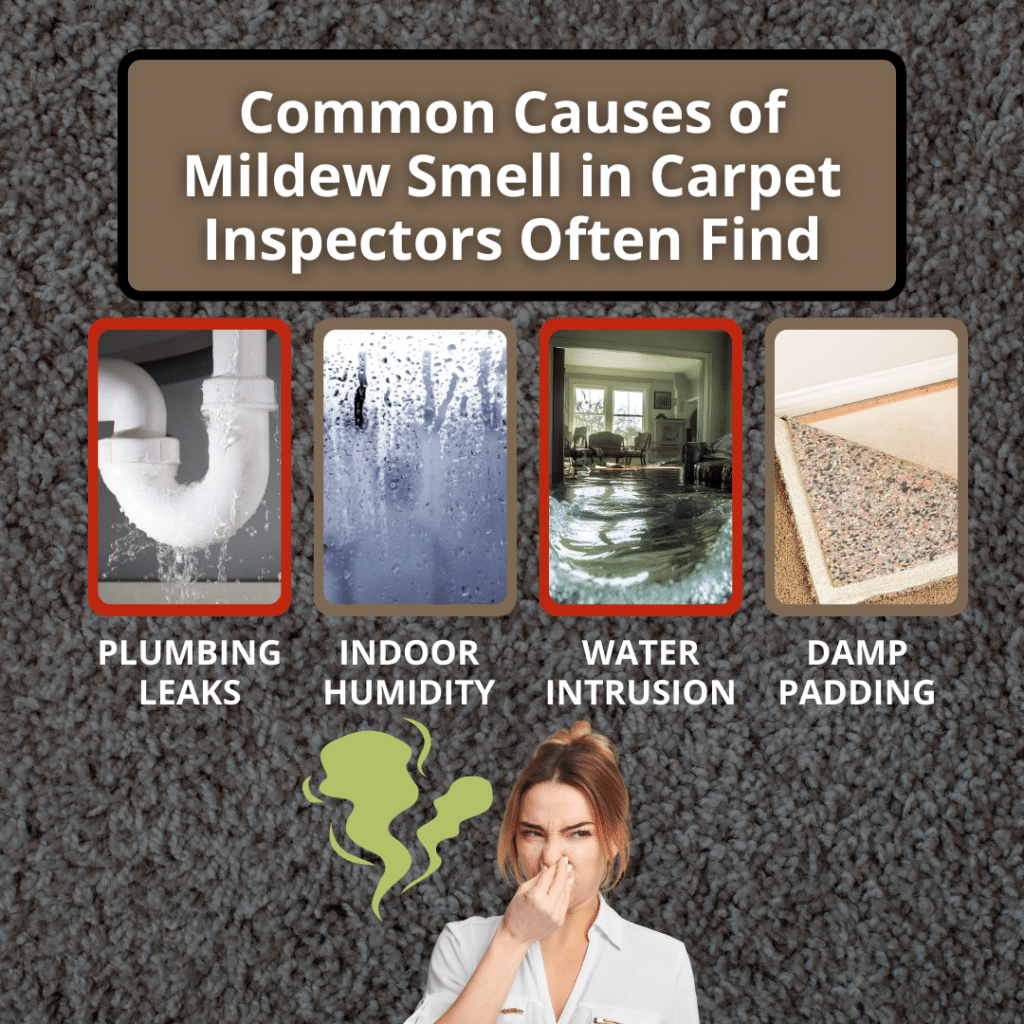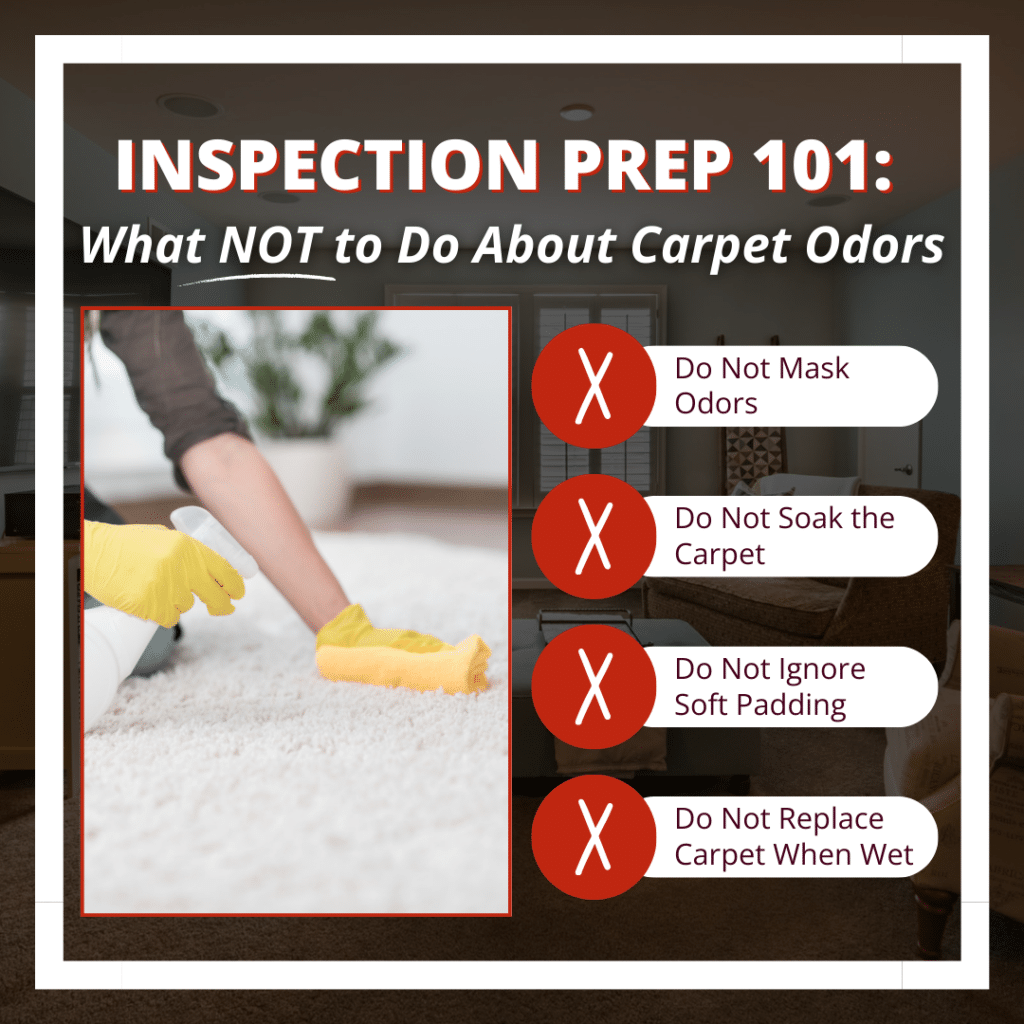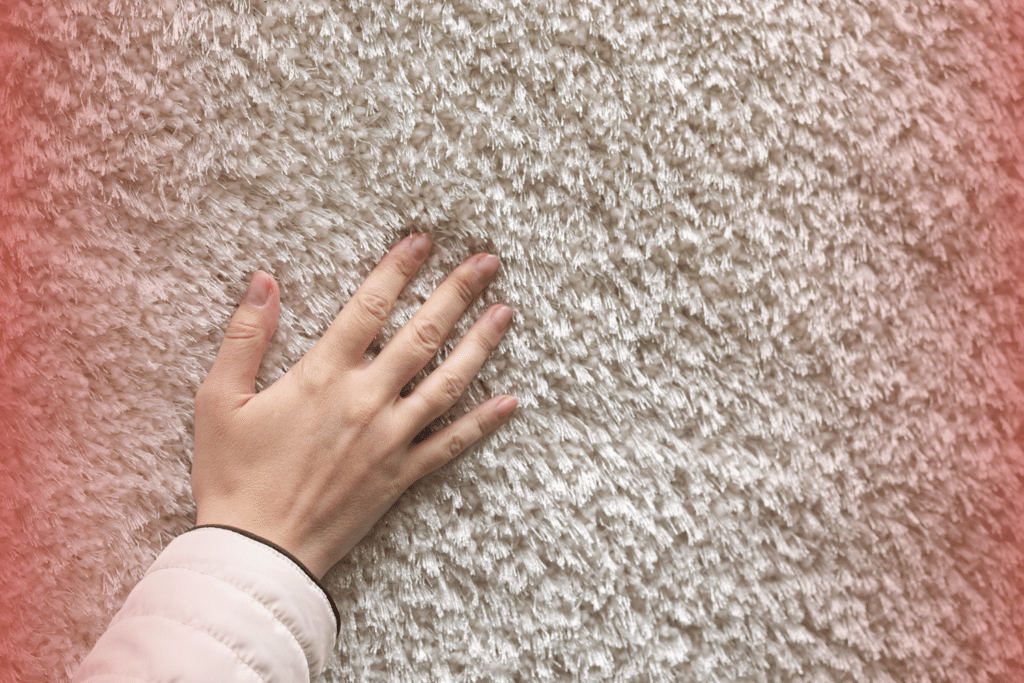A mildew smell in your carpet can be easy to ignore at first, especially if the home looks clean and well-maintained. But when a home inspection is approaching, that lingering odor can quickly become a source of stress.
Many homeowners worry about what it means, how it will be perceived, and whether it could affect a real estate transaction.
If you are searching for how to get mildew smell out of a carpet before a home inspection, here is the most important thing to understand right away:
Odors are usually a symptom of moisture. To truly fix the smell, the moisture problem must be addressed first, followed by proper cleaning and drying.
This guide explains why mildew smells matter during inspections, what commonly causes them, how to approach safe DIY solutions, and when it is best to pause and bring in a professional for an inspection or testing.
Everything is explained with real estate and inspection standards in mind, so you can prepare your home with confidence.
Why a Mildew Smell in the Carpet Matters During a Home Inspection
During a home inspection, inspectors are trained to look for signs of moisture and conditions that could lead to damage or health concerns. A mildew or musty smell often signals that moisture may be present, even if it is not immediately visible.
Home inspectors do not diagnose mold by smell alone. However, odors can point to issues such as past leaks, ongoing humidity problems, or materials that never fully dried.
According to the Environmental Protection Agency, mold can begin growing within 24 to 48 hours when moisture is present. Because of this, inspectors take odors seriously as potential indicators of moisture-related conditions.
From a buyer’s perspective, smells also affect comfort and confidence. Even if no major issue is found, an unexplained odor can raise questions during negotiations.

Common Causes of Mildew Smell in Carpet Inspectors Often Find
In many inspections, the odor is not coming from surface dirt. It is usually tied to moisture trapped below the carpet.
Plumbing or Appliance Leaks
Slow leaks under sinks, around toilets, or near washing machines can soak carpet padding over time without obvious signs.
High Indoor Humidity
Homes without proper ventilation or humidity control can allow carpets to absorb moisture from the air, especially in bedrooms, basements, and lower levels.
Flooding or Water Intrusion
Heavy rain, poor drainage, or foundation seepage can lead to damp carpets, particularly in basements and slab-on-grade homes.
Poor Drying After Cleaning
Carpets that remain damp too long after cleaning can develop mildew odors, especially in humid climates.
Inspectors often find that while carpet fibers may feel dry, the padding or subfloor underneath still holds moisture.
Safe DIY Methods to Remove Mildew Smell from Carpet
DIY methods can help in mild cases, but they should be used carefully.
The goal is to reduce odors without creating new moisture problems or masking underlying issues.
It is also important to recognize that DIY solutions are not always ideal before a home inspection. In many situations, waiting for a professional can lead to better and more reliable results.
Start by Fixing the Moisture Source
Before cleaning, confirm there is no active leak or water intrusion. Check plumbing fixtures, exterior walls, windows, and nearby appliances.
If moisture is still present, cleaning alone will not resolve the smell.
Focus on Drying First
Drying is the most important step in odor removal.
- Use fans to move air across the carpet
- Run a dehumidifier to reduce indoor moisture
- Increase HVAC airflow if possible
- Open windows only if the outdoor humidity is low
The carpet should feel completely dry before applying any odor treatment.
Light Odor Treatment Options
For mild odors, baking soda or enzyme cleaners may help absorb or break down odor-causing material. These methods work best once the carpet and padding are fully dry.
Avoid over-wetting the carpet. Too much liquid can push moisture deeper and make odors worse.
Why Waiting for a Professional Is Often the Better Choice
DIY methods do not always reach moisture trapped in carpet padding or subfloors. Professional equipment is designed to extract moisture and dry materials more thoroughly.
If odors are strong, persistent, or keep returning, stopping DIY efforts and waiting for a professional is often the safest approach before an inspection.
How to Get Mildew Smell Out of a Carpet Before a Home Inspection: Step by Step
If the moisture issue is minor and already resolved, the following steps can help prepare the carpet properly.
Step 1: Confirm There Is No Active Moisture
Inspect plumbing, exterior walls, and nearby appliances. Address any moisture issues before continuing.
Step 2: Dry the Carpet and Padding Completely
Run fans and dehumidifiers continuously for at least 24 to 48 hours. Do not rush this step.
Step 3: Apply a Mild Odor Treatment
Use baking soda or an enzyme cleaner sparingly. Avoid scented products that only mask smells.
Step 4: Allow Full Drying Time
After treatment, allow the carpet to dry again. Odors often return if drying is incomplete.
Step 5: Recheck the Area After Two Days
Return after 48 hours to smell the area again. If the odor remains, professional help is likely needed.
Allowing time between treatment and inspection helps confirm the issue is truly resolved.

What Not to Do Before an Inspection
Certain shortcuts can cause more concern during a home inspection.
- Do not mask odors with sprays or powders
- Do not over-wet the carpet
- Do not ignore soaked padding
- Do not replace carpet without fixing moisture issues
Inspectors are trained to look beyond surface improvements.
When to Wait and Call a Professional
Knowing when to pause DIY efforts can prevent repeat problems.
Signs that professional help may be needed include:
- Odors return quickly
- Carpet feels damp underneath
- Stains appear near walls or seams
- Moisture readings are elevated
Professional services may include deep extraction, padding replacement, moisture testing, or remediation when appropriate.
When Carpet Odors Signal a Bigger Issue
In some homes, mildew smells indicate larger moisture problems.
Possible underlying issues include:
- Hidden plumbing leaks
- Poor exterior drainage
- Foundation moisture intrusion
- Inadequate ventilation or vapor barriers
These issues often come up during inspections and may lead to repair recommendations.
How Home Inspectors Evaluate Odors and Moisture Issues
Inspectors document conditions they observe.
They may note:
- Musty or mildew odors
- Damp materials
- Visible staining
- Elevated moisture readings
- Ventilation concerns
These findings help buyers understand potential risks and plan next steps.
Preparing Your Home for Inspection the Right Way
Carpet odors are often part of a broader moisture picture.
Helpful preparation steps include:
- Running exhaust fans
- Using dehumidifiers in damp areas
- Ensuring HVAC systems are working properly
- Checking basements and crawl spaces
Proper preparation supports a smoother inspection.
Before deciding whether DIY solutions are enough, it helps to see how different odor situations are typically handled. The table below offers a quick reference for homeowners preparing for an inspection.
Quick Reference Table for Homeowners
| Concern | What It Means | Best Action |
| Light odor, dry carpet | Minor issue | DIY drying and odor control |
| Odor returns quickly | Moisture still present | Stop DIY and call a professional |
| Damp padding | Hidden moisture | Professional evaluation |
| Strong musty smell | Possible larger issue | Inspection and remediation |
Related Questions
Can a mildew smell in carpet mean mold?
It can signal mold, but not always. The smell usually indicates that moisture is or was present.
Will a home inspection fail because of odors?
Inspections do not pass or fail homes. Odors may lead to notes or recommendations.
Should I replace the carpet before selling?
Only if the odor source cannot be resolved or the carpet materials are damaged.
How long should carpet dry before an inspection?
They should dry for at least 24 to 48 hours before an inspection.
Can inspectors detect moisture under carpet?
Yes. Inspectors often use moisture meters and visual indicators in humid areas like Georgia.
Conclusion
Learning how to get mildew smell out of a carpet before a home inspection is really about addressing moisture honestly and thoroughly. When moisture is corrected and materials are fully dried, odors often resolve on their own.
When odors are rushed or masked, they tend to return and raise more questions during the inspection.
If you are preparing to buy or sell a home and want clarity about moisture, odors, or other concerns, Champia Real Estate Inspections can help.
A professional inspection provides clear insight into the condition of the home, helping you understand what matters most before moving forward with a real estate decision.
